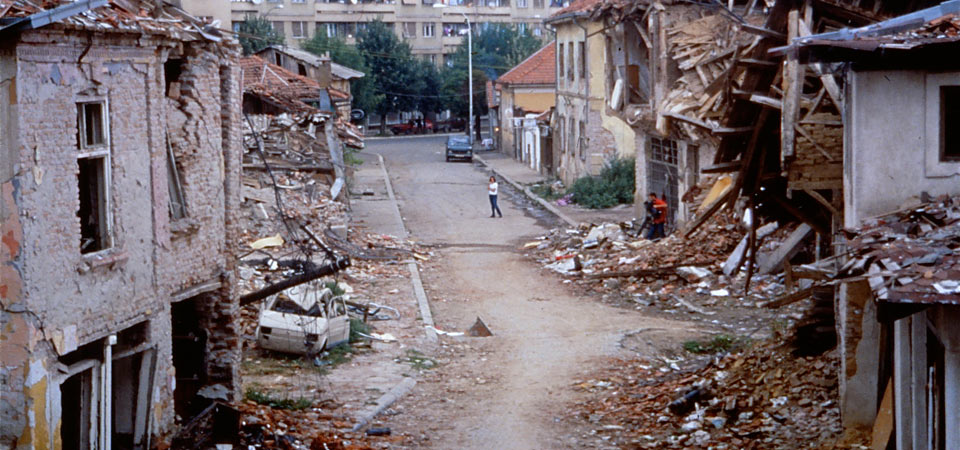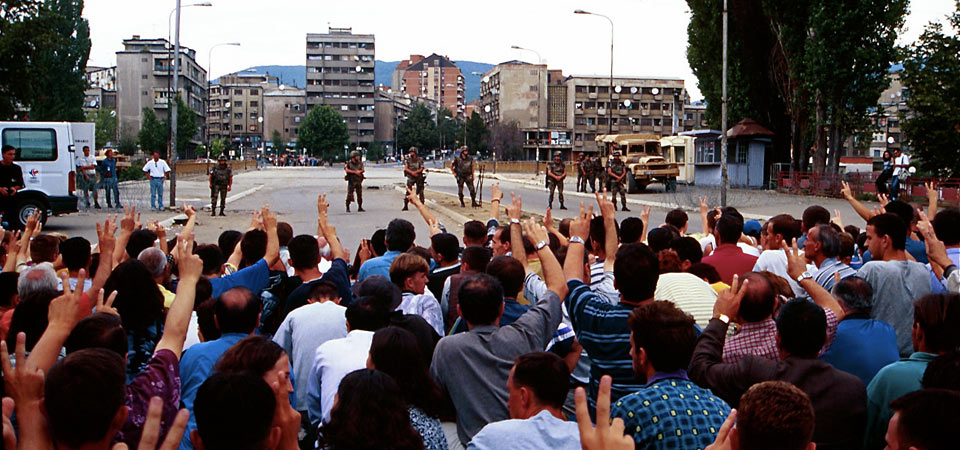Peacemaking & Reconciliation


What is at Stake
The past century saw more persons killed in wars—the overwhelming majority of them civilians—than any other period in human history. From the gulags of the Soviet Union to the death camps of Nazi Germany; from the U.S. military's fire-bombing of Japanese civilians in World War II to its "free fire" zones in Vietnam; from the purges of Mao's Cultural Revolution to right-wing death squads targeting voices for the poor in El Salvador, Guatemala, Chile, and Argentina; from genocide in Rwanda and Sudan to war-caused famine and disease leaving millions dead in Congo; from religious suicide bombers to the U.S.’s “preemptive” invasion of Iraq, resulting in hundreds of thousands of deaths—there is no shortage of evidence of the violence human beings can inflict on one another, all in the name of exalted ideals.
The past century testifies not only to the human capacity for inhumanity, however, but also to the creativity, courage, and effectiveness of nonviolent peacemakers from many religious traditions. From the great Salt March led by Gandhi in India to the Montgomery bus boycott led by Martin Luther King Jr.; from Danish nonviolent resistance to the Nazis during World War II to the Polish Solidarity Movement during the Soviet era; from the National League for Democracy in Burma to the Movement for Democratic Change in Zimbabwe—countless persons and movements have answered the challenge of violence not in kind but by bearing witness to the possibility of another Way. Some of these individuals have been Seventh-day Adventists.
In Solidarity With Peacemakers Around the Globe
Confronted by complex dilemmas of international as well as national and interpersonal violence, the APF embraces the historical Adventist position of nonviolent peace witness and conscientious objection in times of war. We do not claim to answer all questions about the possible moral legitimacy of force in extreme situations. Nevertheless, we call for efforts to reduce strife within and between nations through nonviolent methods and we decline all voluntary participation in the modern military as an institution of violence that too often takes innocent human lives based upon calculations of "the national interest" rather than for the healing of the nations. We stand in solidarity with peacemakers of all faiths, or none, who are working for peace and social justice around the world using the tools of peace, including through efforts to:
Reduce military spending, weapons dealing, and arms proliferation
Foster dialogue for peace across national, ideological, and religious lines
Abolish the death penalty as a cruel and inhumane form of state violence
Document human rights abuses and war crimes under international law
Speak out against all forms of imperialism, militarism, and nationalism as being inconsistent with the life and teachings of Christ in the New Testament
Challenge social, economic, and political systems that produce violence or are themselves forms of “structural violence” and oppression
Serve humanity as noncombatants in times of military draft
Get Involved
The APF is dedicated to finding practical ways of bearing witness in the present to the core convictions of many of the early Adventist pioneers who stood as prophetic voices against violence, militarism, nationalism, and imperialism. We encourage our members to build partnerships with other individuals, faith communities, and organizations already working at the front lines of advocacy, education, and public policy for peace and social justice. The following initiatives illustrate some possible ways to get involved:
This episode is the first of three presentations recorded during the recent JustLove Summit hosted at La Sierra University. Here Marlene Ferreras gives the opening keynote presentation for the event, reflecting on the biblical imperative to respond to social justice issues with love.
Dilys Brooks, Chris Blake, and Nathan Brown discuss the JustLove Collective and the upcoming JustLove Summit.
Rebecca Barceló addresses conflict, considering related topics such as restorative justice, revenge, intimacy, culture, communication, and more.
Sabbath School Discussion: Unity in diversity rather than conformity is critical, but how far can we push it? Diversity in what areas or dimensions? What is required for “unity in diversity”?
Karah Thompson discusses local community building and peacemaking, centering on food and books.
Moe Stiles and Nathan Brown discuss Martin Luther King Jr, the 2021 Adventist Peace Fellowship Summit, refugees, ADRA, the war in Ukraine, and Article 13 of the Universal Declaration of Human Rights.
A collection of podcasts and articles by Adventists about the war in Ukraine.
In this 2010 interview, Bruce Boyd discusses interpersonal conflict.
Ron Osborn discusses John Henry Weidner’s heroic humanitarian actions during WWII.
Charissa Boyd shares about her experiences teaching peace to children.
Geoffrey Nelson-Blake shares his experiences in activism and community organizing.
Kevin Burton describes a recent conference on military participation hosted by the General Conference.
Kevin Burton reports on the recent GC-sponsored event considering the church’s stance on military participation.
APF Director, Jeff Boyd, discusses peacemaking with Jose Briones on the Disruptive Adventism podcast.
The architecture is poignant and unforgettable.
Claudia Allen shares about a multi-day social justice training that she’ll be leading. Plus a surprise announcement.
Andrews University hosts interfaith event in solidarity with local Jewish community.
Divisions in the world and in religious circles call for reflection.
When remember the end of WWI, we also remember those who refused to kill.
Two APF Board members hosted a booth at an NAD-sponsored interfaith event held at Walla Walla University.
Recent Adventist stories from around the Interwebs on peace and justice themes.
APF leadership expresses appreciation for GC policy change regarding investments in weapons manufacturers.
Southern Adventist University to offer summer camps on civic engagement and social work.
The cost of forgiveness to end the cycle of violence.
Judit Manchay and Valerie Sigamani share about their experience at the March for Our Lives (Orlandao, FL).
The 2018 AU Social Consciousness Summit considers the legacy of Martin Luther King, Jr. by commemorating his assassination and celebrating his life and leadership.

“A Matter of Conscience” documents the response of British Seventh-day Adventists faced with conscription in World War I. Many of these men, in keeping with the historical Adventist ethic of conscientious objection and pacifism in times of war, refused to take up weapons. As a result, they were imprisoned by the military in conditions of extreme brutality and inhumanity that nearly cost many of them their lives. This film uncovers this long forgotten history and raises challenging questions about what it means to follow Christ in the present.

“I'm Not Leaving” tells the harrowing story of Rwanda genocide survivor (and APF Advisory Board member) Karl Wilkens, who refused to evacuate Kigali with other foreigners and who helped to save hundreds of orphans lives.

In a courageous sermon entitled, “Changing Times: The Time of Trouble and the Mark of the Beast,” Todd Leonard, senior pastor of Glendale City Church and APF Advisory Board member, asks the urgent question: What does it mean to follow the Christ of the Book of Revelation in the light of violence in Iraq and in Ferguson? (starting at minute 30)

APF co-founder and former director Ronald Osborn wrestles with the challenge of biblical apocalyptic literature for peacemakers and argues for a nonviolent reading of the Book of Revelation.

Commentary: Samir Selmanovic reflects on the Occupy Movement, ‘Otherizing’, and the challenge of dialogue across ideological divides (2012)
Samir Selmanovic is a co-founder of the experimental inter-religious community, Faith House Manhattan, and the author of It's Really All About God: Reflections of a Muslim Atheist Jewish Christian. He reflects on the Occupy Wall Street movement, the perils of "otherizing" the 1%, and what religious communities might help their non-religious neighbors learn about peacemaking.

Trailer: ‘Seventh-Gay Adventists: A Story of Faith at the Margins’ directed by Daneen Akers and Stephen Eyer (2012)
This film explores the complex intersection of faith, identity, and sexuality through the stories of LGBT Adventists who are struggling with their desire to belong to the church they know and love and their need to be fully accepted for who they are. "Whatever one's position regarding homosexuals and the church may be," Andrews Theological Seminary professor Roy Gane says, "this film is worth seeing because it candidly probes issues with real human faces and stories."

Trailer: ‘The Conscientious Objector’ directed by Terry Benedict (2009)
This award-winning film tells the story of Adventist conscientious objector Desmond T. Doss, who refused to carry a weapon and was awarded the Congressional Medal of Honor for his heroism as a medic in World War II. Doss was the first (and only World War II) pacifist to receive this distinction.

By PBS Frontline
This PBS Frontline documentary on the Rwandan genocide in which an estimated 10,000 Adventists were killed, many by their fellow Adventists, includes the story of Carl Wilkens, an Adventist missionary who put his wife and children on a U.S. convoy out of Rwanda but chose to remain in the country. By the night of April 10, 1994, he was the only American left in Rwanda.

This is the second of three presentations recorded during the JustLove Summit hosted at La Sierra University. In this episode, Garrison Hayes gives a keynote presentation on the second day of the event, exploring what is needed to repair past social wrongs.